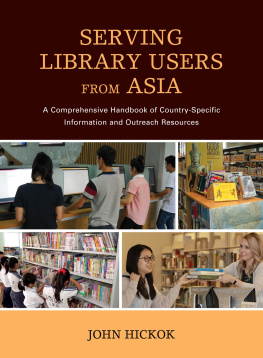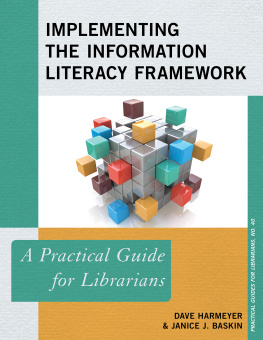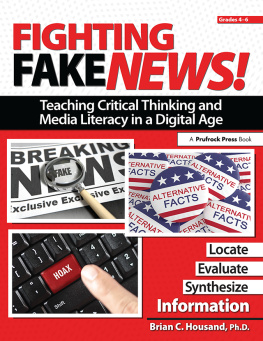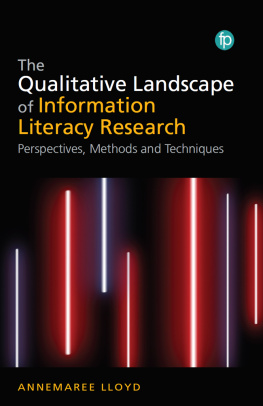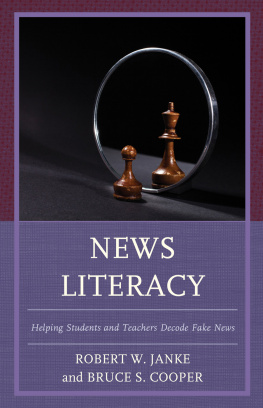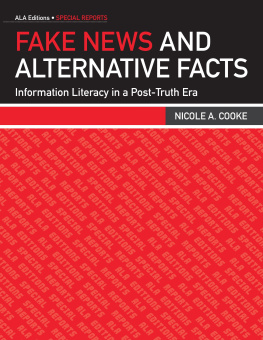Information Literacy and Libraries in the Age of Fake News
Denise E. Agosto, Editor

Copyright 2018 by ABC-CLIO, LLC
All rights reserved. No part of this publication may be reproduced, stored in a retrieval system, or transmitted, in any form or by any means, electronic, mechanical, photocopying, recording, or otherwise, except for the inclusion of brief quotations in a review, without prior permission in writing from the publisher.
Library of Congress Cataloging-in-Publication Data
Names: Agosto, Denise E., editor.
Title: Information literacy and libraries in the age of fake news / Denise E. Agosto, editor.
Description: Santa Barbara : Libraries Unlimited, [2018] | Includes bibliographical references and index.
Identifiers: LCCN 2018028659 (print) | LCCN 2018042542 (ebook) | ISBN 9781440864193 (ebook) | ISBN 9781440864186 (paperback : acid-free paper)
Subjects: LCSH: Information literacy. | Information literacyStudy and teachingUnited States. | Media literacy. | Media literacyStudy and teachingUnited States. | Libraries and educationUnited States. | Fake newsUnited States.
Classification: LCC ZA3075 (ebook) | LCC ZA3075 .I53275 2018 (print) | DDC 028.7dc23
LC record available at https://lccn.loc.gov/2018028659
ISBN: 978-1-4408-6418-6 (paperback)
978-1-4408-6419-3 (ebook)
22 21 20 19 18 1 2 3 4 5
This book is also available as an eBook.
Libraries Unlimited
An Imprint of ABC-CLIO, LLC
ABC-CLIO, LLC
130 Cremona Drive, P.O. Box 1911
Santa Barbara, California 93116-1911
www.abc-clio.com
This book is printed on acid-free paper 
Manufactured in the United States of America
This book is dedicated to David and Rachel. And to a kinder, more thoughtful, better-informed future for our world.
Contents
Julie B. Todaro
Denise E. Agosto
Sharon McQueen
Nicole A. Cooke
Mark Winston
Shannon M. Oltmann
Kay Mathiesen
Joanna M. Burkhardt
Ben Himmelfarb
Kristen Mattson
Belinha De Abreu
Hailey Mooney, Jo Angela Oehrli, and Shevon Desai
Caitlin Shanley and Kristina M. De Voe
Carolina Hernandez
Foreword
While a single event is often identified as an event that changed the world or changed the course of history, one cant help but think that the identification of that event as world- or life-changing must be hyperbole. How can events, actions, activities, and speeches have such an impact that our world shifts or our work changes or the nature of what we believe is altered? It is so, however, and this past yearwith the advent of fake news, our profession was forcedno matter what we believe individuallynot only to begin to review and revise our core practices but also to address our definitions, our processes, our products and tools, or, more simply put, our entire information literacy curriculum.
Just some evidence of the profession stepping in can be found in our Web guides. In the spring of 2017, hundreds of fake news pathfinders had appeared with steady, significant monthly increases in online content designed to address the continuing issues. Almost a year later, over 7,000 specific fake news pages exist. In addition, general critical thinking content has grown, with over 15,000 pages for both general and discipline-specific content now available online for teaching and learning.
Obviously, however, online content is not enough. Now and going forward, we have many difficult issues to deal with for teaching people how to identify, evaluate, and applyincluding dealing with attempts to rewrite history, to interpret reality, to ignore diversity, equity and inclusion, and to shatter our standards and applications for authority and credibility. Specifically:
- What and who defines authority or credibility? Education? Experience? A title? Holding an office (elected or appointed?) Is the source identifiedthe actual source?
- How does and how should currency play a role in our choices and decision making? Is the latest or last information the best in all disciplines or situations?
- What is the underlying evidence for an issue? What makes evidence, evidence?
- What purpose is served by content? Why was it created?
Are we in the worst situation in U.S. history for learning how to make our own choices and informed decisions? There is much debate on that question, and while I dont have the answer, I do know that all of us must take the lead in the debate not only on teaching others how to listen, evaluate, and choose but also on the importance of critically questioning ideas, proposals, stories, and the news.
Although it was and is exciting to be at the center (and often the forefront) of change, whenliterallyour reality is called into question, it is of critical importance that we take great care so that all of our communities understand thatno matter the social or political leanings all people benefit from the truth.
Julie B. Todaro, DLS
20162017 President of the American Library Association
ONE
An Introduction to Information Literacy and Libraries in the Age of Fake News
Denise E. Agosto
When it comes to libraries and issues of information accuracy and authenticity, its all about education. Libraries of all typespublic, corporate, academic, special, government, and schoolare fundamentally educational organizations. We teach our community members about information. That is our special contribution to bettering society.
In many ways, the 2016 U.S. presidential election was a watershed event. It marked the first time a woman had served as a presidential candidate on a major party ticket. It brought to light the potentially misleading nature of large-scale polling data. And it put the term fake news into the daily lexicon, not just in the United States but around the world.
The rise of fake news storiesfalse or misleading stories that are masterfully manipulated to look like credible journalistic reports [and that] are easily spread online to large audiences willing to believe the fictions and spread the word (Holan 2016)are correlated with a rise in widespread public reliance on online sources for news. In fact, the Pulitzer Prizewinning Web site Politifact named fake news its 2016 lie of the year:
Fake news: Hillary Clinton is running a child sex ring out of a pizza shop.
Fake news: Democrats want to impose Islamic law in Florida.
Fake news: Thousands of people at a Donald Trump rally in Manhattan chanted, We hate Muslims, we hate blacks, we want our great country back.
None of those storiesand there are so many more like themis remotely true. (Holan 2016)
The fake news discourse was and is especially relevant to libraries. Librarians have long been in the business of teaching users how to think critically and how to evaluate information. Although school and academic librarians have been the most visible promoters of critical thinking and information evaluation as fundamental to their services, both concepts are core aspects of public, special, and government library services as well. This book revolves around the idea that librarians have both the opportunity and the responsibility to teach their communities how to determine whether the information they encounter online is accurate, reliable, and worthy of being shared.
SOME BACKGROUND: NEWS AND OTHER INFORMATION IN TODAYS COMPLEX INFORMATION ENVIRONMENT
In the wake of the online information explosion, information is produced in many ways that go beyond the traditional writer-editor-publication process that used to underlie the dissemination of most news. Much of the information on the Web today is user-produced, as opposed to being written by professional writers, researchers, news reporters, and academics. Although print newspapers used to be a main source of daily information for most U.S. adults, today only about 20 percent of U.S. adults often get news from a print newspaper (Mitchell, Gottfried, Barthel, and Shearer 2016).
Next page

